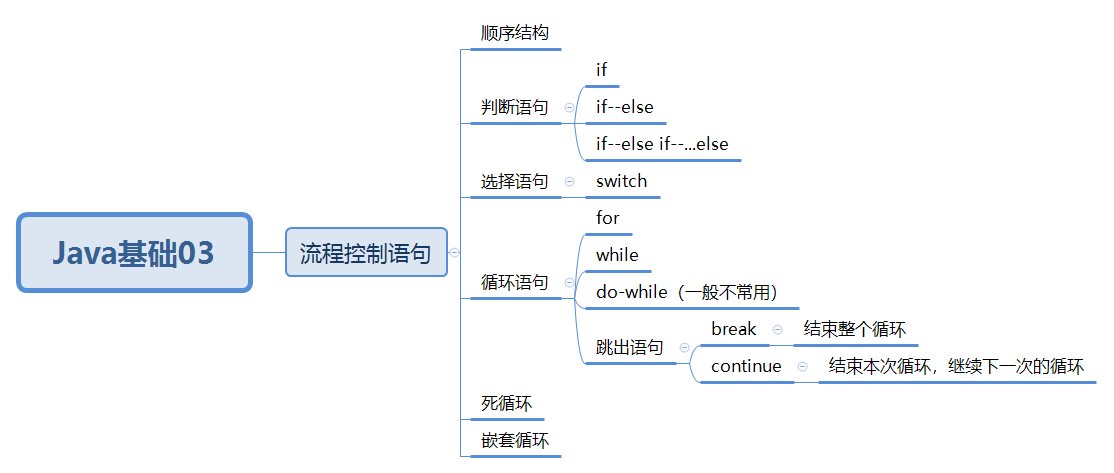
顺序结构
1
2
3
4
5
6
| public static void main(String[] args){
System.out.println(1);
System.out.println(2);
System.out.println(3);
}
|
判断语句
格式对就行
指定考试成绩,判断学生等级
- 90-100 优秀
- 80-89 好
- 70-79 良
- 60-69 及格
- 60以下 不及格
1
2
3
4
5
6
7
8
9
10
11
12
13
14
15
16
17
18
19
|
public class Demon02If{
public static void main(String[] args){
int score = 60;
if(score>=90 && score<=100){
System.out.println("你的成绩属于优秀");
}else if(score>=80 && score<90){
System.out.println("你的成绩属于好");
}else if(score>=70 && score<80){
System.out.println("你的成绩属于良");
}else if(score>=60 && score<70){
System.out.println("你的成绩属于及格");
}else if(score>=0 && score<60){
System.out.println("你的成绩属于不及格");
}else{
System.out.println("数据错误");
}
}
}
|
选择语句
注意事项
- 多个case后面的数值不可以重复
- switch后面小括号当中只能是以下数据类型
- switch语句可以很灵活,前后顺序可以颠倒,而且break语句可以省略,但是会一直向下执行,直到有break语句或者整体结束为止
Switch语句的表达式可以是以下几种类型
- 基本数据类型:byte/short/char/int
- 引用数据类型:String字符串、enum枚举
1
2
3
4
5
6
7
8
9
10
11
12
13
14
15
16
17
18
19
20
21
22
23
24
25
26
27
28
29
30
31
32
| public class Demon03Switch{
public static void main(String[] args){
int num = 1;
switch (num){
case 1:
System.out.println("星期一");
break;
case 2:
System.out.println("星期二");
break;
case 3:
System.out.println("星期三");
break;
case 4:
System.out.println("星期四");
break;
case 5:
System.out.println("星期五");
break;
case 6:
System.out.println("星期六");
break;
case 7:
System.out.println("星期日");
break;
default:
System.out.println("数据不合理");
break;
}
}
}
|
一般default后的break也要书写,并且case如果没有break关键字,会向下继续执行
1
2
3
4
5
6
7
8
9
10
11
12
13
14
15
16
| public class Demon03Switch{
public static void main(String[] args){
int num = 1;
switch (num){
case 1:
System.out.println("星期一");
case 2:
System.out.println("星期二");
break;
case 3:
System.out.println("星期二");
break;
default:
System.out.println("数据不合理");
break;
|
此时输出为
循环语句
主要有for, while, do-while三种循环,格式对就行。
1
2
3
4
5
6
7
8
9
10
11
12
13
14
15
16
17
18
19
20
21
22
23
24
25
26
27
28
29
30
31
32
33
34
35
36
|
public class Demon07Test{
public static void main(String[] args){
int count = 0;
int num = 0;
int j = 1;
for(int i=1; i<=100; i++){
if(i%2==0){
count = count + i;
}
num++;
}
System.out.println(num+" "+count);
}
}
|
注意事项
- 如果条件判断从来没有满足过,那个for和while循环将会执行0次,但是do-while循环至少一次
- for循环的变量在小括号当中定义,只有循环内部才可以使用,while和do-while循环初始化语句本来就在外面,所以出来循环之后还可以继续使用
1
2
3
4
5
6
7
8
9
10
11
12
13
14
15
16
17
18
19
20
|
public class Demon08LoopDifference{
public static void main(String[] args){
for(int i = 1; i < 0; i++){
System.out.println("HelloWorld");
}
System.out.println("========================");
int i = 1;
do{
System.out.println("World");
i++;
}while(i<=10);
System.out.println(i);
}
}
|
死循环
就是在true的环境一直运行
1
2
3
4
5
6
7
8
9
10
11
12
13
14
15
16
17
|
public class Demon11DeapLoop{
public static void main(String[] args){
while(true){
System.out.println("I Love Java");
}
}
}
|
嵌套循环
1
2
3
4
5
6
7
8
9
10
11
12
13
14
15
16
|
public class Deomon13LoopHourAndMinute{
public static void main(String[] args){
for(int hour = 0; hour < 24; hour++){
for(int minute = 0; minute < 60; minute++){
for(int second = 0; second < 60; second++){
System.out.println(hour+"点"+minute+"分"+second+"秒");
}
}
}
}
}
|
